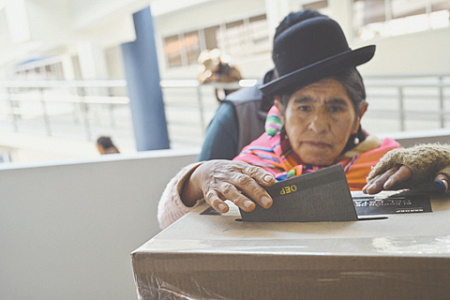
Bolivia is poised for a dramatic political overhaul after the first round of its presidential election signaled the end of a 20-year era of left-wing governance. Conservative candidates Rodrigo Paz of the Christian Democratic Party and former president Jorge Quiroga emerged as the front-runners, securing 31% and 27% of the vote respectively, setting the stage for a decisive runoff and a sharp pivot in the nation’s domestic and foreign policy.
The election delivered a crushing blow to the ruling Movement Towards Socialism (MAS) party, which has been in power since 2006. Its candidate, Andrónico Rodríguez, a protégé of former president Evo Morales, captured a mere 8% of the vote. The party’s collapse, fueled by severe economic challenges and deep internal divisions, marks a radical shift in the political landscape of the landlocked South American nation.
The left’s downfall was exacerbated by a bitter feud between its most prominent figures. Incumbent President Luis Arce, facing dismal approval ratings of around 2%, chose not to seek a second term but successfully maneuvered to disqualify his former mentor, Evo Morales, from the race. In response, Morales, who still commands significant support among the indigenous population, urged his followers to boycott the election, effectively splintering the leftist vote and paving the way for the conservative surge.
As neither of the leading candidates achieved the 50% threshold for an outright victory, the presidency will be decided in a second round on October 19. The role of kingmaker now falls to Samuel Medina, a 66-year-old business magnate often dubbed the “Bolivian Trump,” who finished in third place with a critical 20% of the vote. It is widely anticipated that Medina, who previously introduced Burger King to the country, will leverage his influence and financial backing to support the more staunchly pro-market candidate, Jorge Quiroga.
A victory for either Paz or Quiroga guarantees a profound reorientation of Bolivia’s foreign policy. The country is expected to abandon its path toward BRICS membership and distance itself from allies like Russia and China. Instead, La Paz will likely seek stronger integration with the Mercosur trade bloc and foster closer ties with the United States, the United Kingdom, and Israel, in a move that could mirror the pro-Western policies of President Javier Milei in neighboring Argentina.
This geopolitical pivot is driven by stark economic realities. Unfulfilled promises of major Russian investment in Bolivia’s lucrative lithium sector, coupled with the nation’s difficult economic situation, created a political vacuum that right-wing candidates have successfully exploited. Quiroga has explicitly promised to attract American investment into the energy and mining sectors and has pledged to review all natural resource contracts signed with China by previous governments.
Regardless of who wins the runoff, Bolivia is set for monumental change. The new administration will almost certainly cancel or fundamentally renegotiate agreements and memorandums signed with Russia and will significantly reduce China’s economic footprint. In desperate need of capital, Bolivia will turn to the West and its pro-market neighbors, marking a definitive end to its socialist chapter and heralding a new, uncertain era in its international relations.
